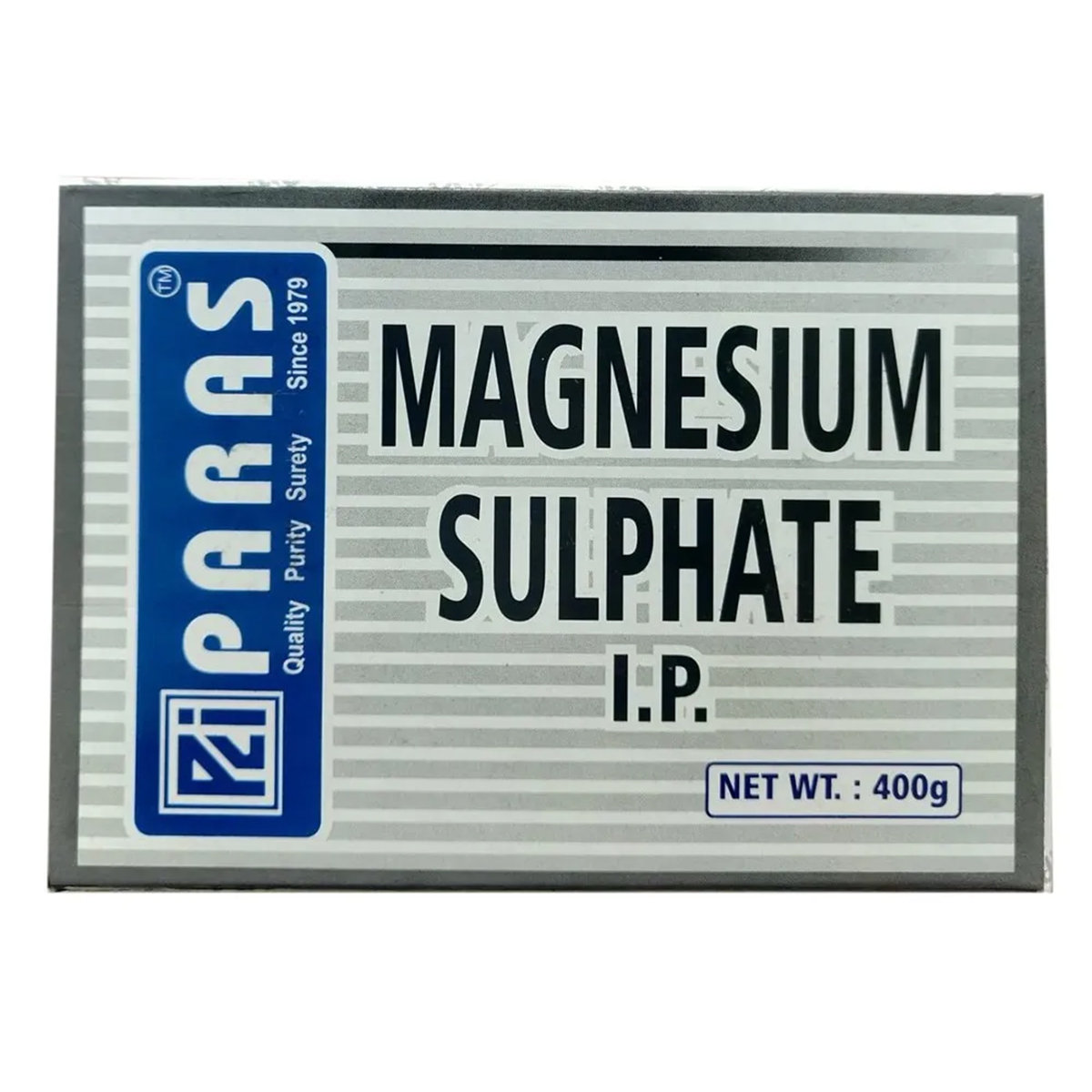Magnesium Sulfate
About Magnesium Sulfate
Magnesium Sulfate is a mineral supplement primarily used to treat acute hypomagnesaemia, a condition characterized by abnormally low magnesium levels in the blood. It is also a laxative that is used to relieve constipation, indigestion, heartburn and acidity.
Magnesium Sulfate contains Magnesium sulfate. It is a mineral supplement and an electrolyte that treats and prevents low magnesium levels in the blood. It is essential for the proper functioning of muscles and nerves. It also increases the water content in the intestines, thus helping relieve indigestion.
You are advised to take Magnesium Sulfate for as long as your doctor has suggested it for you, depending on your medical condition. Like all medicines, Magnesium Sulfate also causes side effects, although not everybody gets them. Common side effects of Magnesium Sulfate include stomach upset and diarrhoea. These side effects do not require medical attention and will resolve gradually over time. However, if these side effects persist for a longer time, please seek medical advice.
Please do not skip or stop taking Magnesium Sulfate midway without consulting your doctor. Do not use magnesium sulfate as a laxative if you have severe stomach pain, nausea, vomiting, a perforated bowel, bowel obstruction, severe constipation, colitis (colon inflammation), and toxic megacolon (enlarged colon). Let your doctor know if you are a pregnant or a breastfeeding woman before taking Magnesium Sulfate. Avoid alcohol consumption while being treated with Magnesium Sulfate. The safety and efficacy of magnesium sulfate to relieve constipation have not been established in children younger than six years of age.
Uses of Magnesium Sulfate
Medicinal Benefits
Magnesium Sulfate contains Magnesium sulfate. It is a mineral supplement and an electrolyte that treats abnormally low levels of magnesium in the blood. It is also used to relieve constipation and other gastrointestinal disorders like acidity, indigestion, and heartburn with its laxative properties. Magnesium aids in the normal functioning of cells, nerves, muscles, bones, and the heart.
Directions for Use
Storage
Side Effects of Magnesium Sulfate
- Dizziness
- Headache
- Stomach upset
- Flushing
- Sweating
- Diarrhoea
Drug Warnings
Inform your doctor if you have a medical history of liver/kidney/heart diseases, diabetes, alcohol dependence, phenylketonuria (increased phenylalanine levels in the blood), eating disorders or are on a low-magnesium diet before starting Magnesium Sulfate. Do not use magnesium sulfate as a laxative if you have severe stomach pain, nausea, vomiting, a perforated bowel, bowel obstruction, severe constipation, colitis (colon inflammation), and toxic megacolon (enlarged colon). Let your doctor know if you are a pregnant or breastfeeding woman before taking Magnesium Sulfate. Avoid alcohol consumption while taking Magnesium Sulfate as it might increase the occurrence of side effects. The safety and efficacy of Magnesium Sulfate have not been established in children younger than six years of age.
Drug Interactions
Drug-Drug Interaction: Magnesium Sulfate may interact with heart-related medicines (digoxin), antibiotics (doxycycline, tetracycline, ciprofloxacin, levofloxacin), thyroid medication (levothyroxine), osteoporosis medicine (alendronate), and supplements (calcium, cholecalciferol).
Drug-Food Interaction: Avoid the intake of alcohol while using Magnesium Sulfate to prevent further worsening of side effects.
Drug-Disease Interaction: Inform your doctor if you have liver/kidney/heart diseases, diabetes, alcohol dependence, phenylketonuria, colitis, toxic megacolon, perforated bowel, bowel obstruction, eating disorders or are on a low-magnesium diet before starting Magnesium Sulfate.
Drug-Drug Interactions Checker List:
Safety Advice

Alcohol
consult your doctorAvoid taking alcohol while using Magnesium Sulfate to prevent worsening of the side effects.

Pregnancy
cautionPlease consult your doctor before taking Magnesium Sulfate if you are pregnant or planning to conceive.

Breast Feeding
cautionPlease consult your doctor before taking Magnesium Sulfate if you are a breastfeeding mother.

Driving
consult your doctorMagnesium Sulfate usually does not interfere with your driving ability; however, please consult your doctor if you have any concerns regarding this.

Liver
cautionMagnesium Sulfate should be used with caution in patients with liver impairment/liver disease. Please consult your doctor if you have a liver impairment or any concerns regarding this.

Kidney
cautionMagnesium Sulfate should be used with caution in patients with kidney impairment/kidney disease. Please consult your doctor if you have kidney impairment or any concerns regarding this.

Children
cautionThe safety and efficacy of Magnesium Sulfate have not been established in children younger than six years of age.
Habit Forming
Diet & Lifestyle Advise
- Please take foods rich in probiotics such as yoghurt/curd, kefir, sauerkraut, tempeh, kimchi, miso, kombucha, buttermilk, natto, and cheese.
- Take fibre-rich food like whole grains, beans, lentils, berries, broccoli, peas, and bananas to aid digestion.
- Avoid eating too much, eating too fast, eating high-fat foods, or eating during stressful situations that can burden your stomach.
- Eating small meals at regular intervals the so that stomach does not have to work as hard or as long.
- Smoking can irritate the stomach lining; hence please avoid it.
- Sleep with your head elevated (at least 6 inches) above your feet and use pillows. This helps digestive juices to flow into the intestines rather than to the oesophagus.
Patients Concern
Disease/Condition Glossary
Hypomagnesaemia: It is a condition that occurs when a person has abnormally low levels of blood. This occurs when a person does not get enough magnesium in the diet, or he/she is unable to absorb magnesium properly. Symptoms include nausea, vomiting, weakness, personality changes, tremor, fatigue, seizures, irregular heartbeat, and high blood pressure.
Indigestion: It is the inability to digest food that is associated with pain and discomfort in the stomach. Symptoms include bloating, abdominal pain, burning sensation in the stomach, gas, and belching.
Acidity: The stomach is usually protected from acid by a mucous layer. In some cases, the mucous layer gets eroded due to excess acid production, which leads to complications like acidity. Due to this, acid frequently flows back into the food pipe (oesophagus). This backflow (acid reflux) irritates the food pipe and causes heartburn. Symptoms include heartburn, sour or bitter taste in the mouth, and difficulty swallowing.
FAQs
Magnesium Sulfate contains Magnesium sulfate. It works by treating low levels of magnesium in the body. It is also effective in treating constipation and indigestion by increasing the water content in the intestines.
Please do not stop taking Magnesium Sulfate without consulting your doctor on your own. Continue taking Magnesium Sulfate for as long as your doctor has recommended it to you. Do not be reluctant to speak with your doctor if you experience any difficulty while taking Magnesium Sulfate.
Do not use magnesium sulfate for constipation if you have severe stomach pain, nausea, vomiting, a perforated bowel, a bowel obstruction, severe constipation, colitis (colon inflammation), and toxic megacolon (enlarged colon). Also, if you experience any rectal bleeding or have no bowel movements after using magnesium sulfate as a laxative, please discontinue immediately and seek medical advice.
Store Magnesium Sulfate according to the instructions on the leaflet and away from sunlight at a temperature not exceeding 25°C. Dispose of unused medicine. Keep it out of reach from pets and children.
Take the missed dose as soon as possible. However, if it is time for the next dose, skip the missed dose and go back to your regular dosing schedule. Do not double the dose.










